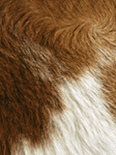
Annual Review of Animal Biosciences
Scope & Guideline
Exploring Innovations in Animal Biosciences
Introduction
Aims and Scopes
- Animal Genetics and Genomics:
A core focus on the genetic and genomic mechanisms underlying animal health, behavior, and evolution, including studies on population genomics, genetic variation, and the use of genomics in conservation efforts. - Conservation and Biodiversity:
Research related to conservation strategies, including genetic approaches to the preservation of endangered species, the role of zoos, and the impact of environmental changes on biodiversity. - Animal Health and Disease Management:
Exploration of disease ecology, zoonotic diseases, and the implications of animal health on public health, emphasizing the need for interdisciplinary approaches to manage animal diseases. - Microbiome and Physiological Ecology:
Investigation into the role of microbiomes in animal health and nutrition, and how these interact with physiological stressors, promoting a holistic understanding of animal wellness. - Reproductive Biology and Biotechnology:
Studies on reproductive mechanisms, including advances in reproductive technologies and their applications for both agricultural and conservation purposes. - Environmental Impact and Sustainability:
Research on the ecological implications of animal production systems, emphasizing sustainable practices in animal agriculture and the mitigation of environmental impacts.
Trending and Emerging
- Integration of Genomics in Conservation Efforts:
There is a growing trend towards leveraging genomic technologies for conservation purposes, focusing on understanding genetic diversity and resilience in wildlife populations, which is crucial in the face of climate change. - Microbiome Research and Its Applications:
An increase in studies related to the animal microbiome highlights its relevance for health, nutrition, and disease management, showcasing its potential for enhancing animal welfare and production efficiency. - Interdisciplinary Approaches to Animal Health:
Emerging themes reflect a shift towards interdisciplinary research that combines animal health with environmental science, public health, and agricultural practices, emphasizing holistic approaches to complex issues. - Advancements in Biotechnology for Animal Production:
Innovative biotechnological applications, such as cultured meat and cloning technologies, are gaining traction, reflecting an interest in sustainable alternatives to traditional animal agriculture. - Impact of Climate Change on Animal Physiology and Behavior:
Research is increasingly focusing on how climate change affects animal physiology, behavior, and habitat use, highlighting the urgent need to understand these impacts for effective conservation and management strategies.
Declining or Waning
- Traditional Animal Breeding Techniques:
While breeding remains a vital aspect of animal science, there is a noticeable decrease in the emphasis on traditional breeding methods in favor of genetic and genomic advancements that offer more effective solutions. - Basic Behavioral Studies in Non-Model Organisms:
Research focusing on basic behavioral observations in non-model organisms has become less frequent, potentially overshadowed by studies that integrate behavioral data with genetic and ecological contexts. - Conventional Animal Agriculture Practices:
As the focus shifts towards sustainability and environmental concerns, traditional practices in animal agriculture are seeing less attention, with researchers seeking innovative solutions to modern challenges. - In-depth Studies of Rare Diseases in Animals:
There appears to be a decline in the volume of publications specifically addressing rare diseases in animals, possibly due to a shift towards more common zoonotic diseases and their implications for public health. - Invertebrate Physiology:
Research on invertebrate physiology, while still important, has seen decreased representation in recent publications, as attention is increasingly directed towards vertebrate studies and their implications for conservation and agriculture.
Similar Journals
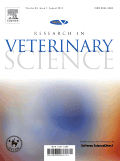
RESEARCH IN VETERINARY SCIENCE
Pioneering Research for Innovative Veterinary PracticesRESEARCH IN VETERINARY SCIENCE, published by Elsevier Science Ltd, stands as an authoritative platform in the field of veterinary studies. With its origins dating back to 1965, this prestigious journal is recognized for its contribution to the advancement of veterinary knowledge and practices, boasting a remarkable Q1 categorization in Veterinary (miscellaneous) and ranking 24th out of 194 in the Scopus veterinary general category, placing it in the top 13% of its field. The journal presents a diverse range of research articles that explore critical topics in veterinary science, thereby facilitating evidence-based practices and innovations. Although currently not an open-access journal, it remains highly accessible through institutional and personal subscriptions, allowing researchers, professionals, and students to benefit from its rich collection of studies. As it moves toward 2024, RESEARCH IN VETERINARY SCIENCE continues to be a vital resource for those dedicated to improving animal health and advancing veterinary science.

Animal Microbiome
Pioneering Discoveries in Animal MicrobiologyAnimal Microbiome is a leading peer-reviewed journal dedicated to advancing research in the interrelated fields of microbiology, veterinary science, and animal biology. Published by BMC, this open access journal has been a valuable resource since its launch in 2019, providing a platform for the dissemination of groundbreaking studies and reviews that enhance our understanding of the complex microbial communities and their effects on animal health and ecosystems. As evidenced by its prestigious Q1 rankings in various categories—including Agricultural and Biological Sciences, Animal Science and Zoology, and Microbiology—Animal Microbiome reaches a global audience, positioning itself among the top 5% of journals in its field. With an impactful presence in Scopus, where it ranks highly for its contributions, researchers, professionals, and students can access a wealth of knowledge and innovations through its open access model. The journal aims to foster interdisciplinary collaboration and elevate scientific discourse surrounding animal microbiomes, ultimately contributing to enhanced animal welfare, improved agricultural practices, and a deeper understanding of microbial dynamics in health and disease.

PAKISTAN JOURNAL OF ZOOLOGY
Unveiling the mysteries of wildlife through rigorous research.Pakistan Journal of Zoology, established in 1975 and published by the Zoological Society of Pakistan, is a pivotal resource in the field of zoology and animal science, contributing to the academic discourse and research advancements in the region. With an ISSN of 0030-9923, this journal strives to disseminate innovative research findings and scholarly articles that explore various facets of animal biology, ecology, and conservation. Although classified in the Q4 quartile within the animal science category, its commitment to providing a platform for emerging researchers makes it crucial for those in the zoological community. The journal covers a broad range of topics relevant to contemporary issues in zoology, promoting both local and international collaborations. Situated in Lahore, Pakistan, its contributions are vital for promoting biodiversity awareness and conservation efforts within the region. Accessible research outputs empower students and professionals alike to engage in critical discussions and applications within the disciplines of zoology and animal science.
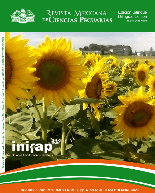
Revista Mexicana de Ciencias Pecuarias
Elevating Veterinary Science with Open Access InsightsRevista Mexicana de Ciencias Pecuarias, published by INIFAP-CENID PARASITOLOGIA VETERINARIA, is a prominent open-access journal since 2010 that caters to the fields of Animal Science and Veterinary Medicine. Based in Mexico, this journal addresses critical issues in animal health, production, and welfare, making it instrumental for researchers, professionals, and students seeking to advance their knowledge and practices. With an impact factor that reflects its growing influence, particularly in the Q3 quartile rankings in both Animal Science and Zoology as well as Veterinary (Miscellaneous) categories, the journal provides a vital platform for the dissemination of innovative research and findings. Additionally, its Scopus Ranks position highlights its role in publishing significant contributions to the fields of Veterinary Science and Agricultural Biology. The journal fosters a collaborative learning environment through its open-access model, ensuring that valuable insights are accessible to a wide audience. For those committed to enhancing animal well-being and advancing veterinary practices, the Revista Mexicana de Ciencias Pecuarias stands as a key resource through its rigorous peer-reviewed publication process and commitment to scientific excellence.

Zoological Letters
Connecting researchers to the pulse of zoological discovery.Zoological Letters, published by BMC, is a premier open-access journal dedicated to advancing the field of zoology and animal science. Since its inception in 2015, the journal has established itself as a critical platform for researchers to disseminate their findings and contribute to the ongoing discourse in this vibrant discipline. Based in the United Kingdom, Zoological Letters boasts an impressive Q2 category ranking in Animal Science and Zoology for 2023, placing it within the top 25% of journals in the field. With a Scopus rank of #116 out of 490, representing the 76th percentile, it showcases the influence and reach of the research published within its pages. The journal’s substantial focus on contemporary issues and methodologies ensures that it is a vital resource for academics, professionals, and students alike, fostering innovation and collaboration throughout the global scientific community. Open access since 2015, Zoological Letters is committed to making scientific knowledge accessible, thus enhancing the visibility and impact of research in zoological studies.
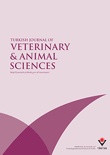
TURKISH JOURNAL OF VETERINARY & ANIMAL SCIENCES
Advancing Veterinary Science for a Healthier Tomorrow.TURKISH JOURNAL OF VETERINARY & ANIMAL SCIENCES is a distinguished peer-reviewed journal dedicated to advancing knowledge in the field of veterinary sciences and animal health. Published by the Tubitak Scientific & Technological Research Council Turkey, this journal provides a platform for high-quality research, fostering scientific inquiry that spans various aspects of veterinary medicine, animal biology, and animal husbandry. With an impact factor that reflects its growing influence within the Q3 category of Veterinary (miscellaneous) according to the 2023 rankings, it is strategically positioned in the academic landscape, ranked #112 out of 194 in the broader veterinary field. The journal is committed to open access publications, ensuring that research is accessible to a global audience, facilitating collaboration and knowledge sharing among researchers, professionals, and students. By covering a broad spectrum of topics from clinical research to veterinary policy, the TURKISH JOURNAL OF VETERINARY & ANIMAL SCIENCES plays a crucial role in enhancing the understanding and welfare of animal species, thereby contributing significantly to both scientific advancement and practical applications in veterinary practice.

Slovenian Veterinary Research
Fostering Innovation in Veterinary ResearchSlovenian Veterinary Research, published by the University of Ljubljana, serves as a significant platform for the dissemination of research within the veterinary field. With an ISSN of 1580-4003 and an E-ISSN of 2385-8761, this open-access journal has made its content freely available to the global research community since 2021, enhancing accessibility and engagement. The journal's scope includes a diverse range of topics relevant to veterinary science, aiming to foster innovation and collaboration among researchers, professionals, and students in the field. Although currently categorized in the Q4 quartile for veterinary studies, the journal is committed to improving its impact and visibility, particularly as it converges on its upcoming years of operation from 2007 to 2024. As it strives to elevate its Scopus ranks, currently positioned at rank #162/194 in General Veterinary, Slovenian Veterinary Research provides a vital resource for advancing knowledge and best practices in veterinary medicine. For anyone interested in the latest veterinary research trends and findings emanating from Slovenia and beyond, this journal represents an essential source of information.

Tropical Animal Science Journal
Unleashing Potential in Food Animal Science and Veterinary CareTropical Animal Science Journal, ISSN 2615-787X, E-ISSN 2615-790X, is an esteemed open-access journal published by the Bogor Agricultural University, Faculty of Animal Science. Launched in 2018, this journal serves as a pivotal platform for disseminating high-quality research in the fields of Animal Science, Food Animals, and Veterinary Medicine. With its significant presence in Indonesia and a commitment to scientific innovation, it has achieved a Q3 ranking in Animal Science and Zoology and Food Animals, as well as a Q2 ranking in Veterinary (miscellaneous) as of 2023. The journal also enjoys favorable Scopus rankings, placing it in the 61st percentile for General Veterinary and demonstrating its relevance and impact in the academic community. As an advocate for open-access publishing since its inception, the journal enhances accessibility to critical research findings, making it an invaluable resource for researchers, professionals, and students alike who aim to advance their knowledge and contribute to the fields of tropical animal science.
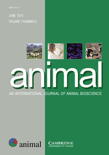
Animal
Connecting researchers for a sustainable future in animal welfare.Animal is a leading academic journal published by Elsevier that stands at the forefront of research in the field of Animal Science and Zoology. Founded in 2007, it has rapidly garnered a prestigious reputation, achieving a remarkable Q1 ranking in its category for the year 2023, placing it in the top 4% of journals in the discipline. With an impressive impact, as indicated by its rank of 19 out of 490 in Agricultural and Biological Sciences on Scopus, this journal serves as a vital platform for researchers, professionals, and students to disseminate groundbreaking findings and interdisciplinary studies. Animal not only offers paid subscription access but also provides an option for Open Access, thereby enhancing the visibility and reach of significant research contributions. With its comprehensive scope and commitment to advancing the understanding of animal biology, behavior, and welfare, Animal plays a crucial role in shaping the future of animal science. For anyone invested in the environment, veterinary medicine, or wildlife management, this journal is an essential resource that fosters knowledge exchange and continued developments in the field.

Animal Reproduction
Empowering the next generation of reproductive biologists.Animal Reproduction is a premier open-access journal published by the Brazilian Coll Animal Reproduction, focusing on the dynamic field of reproductive biology within both veterinary science and animal husbandry. Established in 2004, the journal has rapidly gained prominence, securing a Q2 ranking in both Animal Science and Zoology as well as veterinary disciplines as of 2023. With a growing impact factor and an engaged readership, Animal Reproduction serves as a vital platform for researchers, professionals, and students seeking to disseminate and gain insights into the latest studies and innovations in animal reproductive health and technology. Based in Brazil, the journal's content spans a wide array of topics essential for advancing the scientific understanding of reproduction in animals, thus contributing to improved practices in veterinary medicine and livestock management. The journal is indexed in major databases such as Scopus, ensuring that the research published is accessible to a global audience. Whether you're a seasoned researcher or a student looking to deepen your knowledge, Animal Reproduction is indispensable for anyone engaged in this critical area of study.